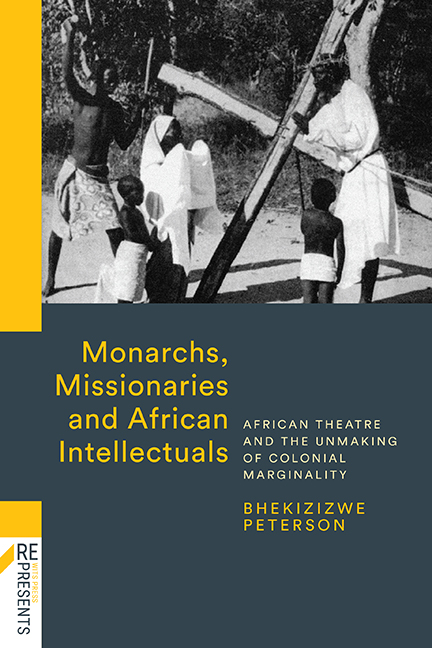 Monarchs, Missionaries and African Intellectuals
Monarchs, Missionaries and African Intellectuals Book contents
- Frontmatter
- Dedication
- Contents
- Preface and Acknowledgements
- Note on Zulu Orthography
- Introduction: Staging the (Alien)nation: African Theatre and the Colonial Experience
- 1 ‘All Work and No Play Makes Civilisation Unattractive to the Masses’: Theatre and Mission Education at Mariannhill
- 2 ‘I Will Open My Mouth in Parables’:Accounting for the Crevices in Redemption
- 3 Parallel Time, Parallel Signs, Discordant Interpretations
- 4 B.W. Vilakazi and the Poetics of the Mental War Zone
- 5 The Bantu Men’s Social Centre: Meeting the Devil on his own Ground
- 6 The Bantu Dramatic Society According to a Gossip Columnist
- 7 Contesting ‘The Bantu Imagination’: The British Drama League & The New Africans
- 8 H.I.E. Dhlomo: Measuring the Distance Between Armageddon and Revolution
- 9 ‘The Black Bulls’: Assembling the Broken Gourds
- 10 Hegemony and Identity: What a Difference ‘Play’ Makes
- Notes
- Bibliography
- Index
8 - H.I.E. Dhlomo: Measuring the Distance Between Armageddon and Revolution
Published online by Cambridge University Press: 12 October 2021
- Frontmatter
- Dedication
- Contents
- Preface and Acknowledgements
- Note on Zulu Orthography
- Introduction: Staging the (Alien)nation: African Theatre and the Colonial Experience
- 1 ‘All Work and No Play Makes Civilisation Unattractive to the Masses’: Theatre and Mission Education at Mariannhill
- 2 ‘I Will Open My Mouth in Parables’:Accounting for the Crevices in Redemption
- 3 Parallel Time, Parallel Signs, Discordant Interpretations
- 4 B.W. Vilakazi and the Poetics of the Mental War Zone
- 5 The Bantu Men’s Social Centre: Meeting the Devil on his own Ground
- 6 The Bantu Dramatic Society According to a Gossip Columnist
- 7 Contesting ‘The Bantu Imagination’: The British Drama League & The New Africans
- 8 H.I.E. Dhlomo: Measuring the Distance Between Armageddon and Revolution
- 9 ‘The Black Bulls’: Assembling the Broken Gourds
- 10 Hegemony and Identity: What a Difference ‘Play’ Makes
- Notes
- Bibliography
- Index
Summary
The discussion of identity and alterity in the last chapter was broached from the vantage point of the imperial imagination. It is now essential to consider the same topic from the perspective of H.I.E. Dhlomo, one of South Africa's most illustrious playwrights and pioneering African critics. Dhlomo's writings are an impressive register and response to the formidable challenges that faced Africans during the first three decades of the century. The social ostracism of Africans was analogous to the marginal existences that confronted the black intelligentsia elsewhere in Africa and in the diaspora where, in spite of their unparalleled experiences and deference to the colonial world, they were essentially ‘not of it’. Constantly demonised as a menace to society, the African, Plaatje averred, was treated as no less than a fugitive, a pariah in the land of his birth. Dhlomo, predictably, also encountered the world around him, in Du Bois's evocative phrase, ‘darkly as through a veil’. The result is the peculiar sensation of double consciousness that we encountered as the battlefields in Vilakazi's mind and which Du Bois refers to as ‘two warring ideas in one dark body, whose dogged strength alone keeps it from being torn asunder’. In his plays Dhlomo intimates the politics of double consciousness through characters who parade as fools and hide their wisdom ‘under the cloak of simplicity and jest’ (Dingane, 104). Dhlomo regarded such deceptions as common in South African society. Echoing Langston Hughes's Minstrel Man, Dhlomo remarked ‘how often one hears people say the African is happy, carefree and insensitive because he smiles – ignorant of the fact that behind those smiles and calm expression, lies a rebellious soul …’ It was precisely the disjuncture between the enlightened promises of civilisation and the barbarity of its racist unfolding that marked Dhlomo's ideology with a passionate and striking meditation on the tormenting shadows of Armageddon and revolution. The intermediary space with its tension ‘between a modernity that often is an illusion of development, and a tradition that sometimes reflects a poor image of a mythical past’ is, as Mudimbe has underscored, ‘the locus of paradoxes’.
- Type
- Chapter
- Information
- Monarchs, Missionaries and African IntellectualsAfrican Theatre and the Unmaking of Colonial Marginality, pp. 187 - 204Publisher: Wits University PressPrint publication year: 2021


